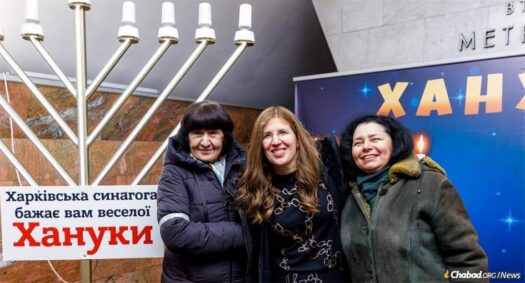
In War-Torn Ukraine, Rebbetzin Miriam Moskovitz Fulfills Childhood Dream of Helping Others
by Faygie Levy Holt – chabad.org
Miriam Moskovitz can still remember the call that changed everything. Almost a year ago exactly, on Feb. 24, 2022, she was awakened at 5 a.m. in her Kharkov, Ukraine, home by the sound of the phone ringing. She picked up, it was a local Jewish community member.
“I asked him, ‘Is everything OK?’” Moskovitz recalls. “He said ‘No! They’re bombing Kharkov!’”
Moskovitz and her husband, Rabbi Moshe Moskovitz, have served as directors of Chabad-Lubavitch of Kharkov, the far-eastern Ukrainian city, since 1990. It was from there that they experienced the disintegration of the Soviet Union and birth of an independent Ukraine. It was there that they’d met and helped countless Soviet-born Jews reconnect to their Judaism, before watching them leave for the United States or Israel. Even after the massive waves of emigration, however, the Moskovitzes knew their place was in Kharkov, to which they were sent by the Rebbe, Rabbi Menachem M. Schneerson, of righteous memory, and whose many remaining Jews would be their focus to the present day. They’d restored the city’s old Choral synagogue, built a Jewish school, a yeshiva and a girls’ school—everything a Jewish community needed. Indeed, only weeks earlier the Moskovitzes had celebrated their daughter’s wedding in their hometown.
Now when Miriam opened her window, it was the sounds of exploding artillery and the acrid smell of burning that wafted in. She’d experienced a lot in her three decades in Ukraine, but not war, especially not like this one—unfolding on the internet and on her doorstep in real-time. Still, she knew, the work she and her husband had been sent by the Rebbe to do in Ukraine—together with her Chabad emissary colleagues throughout the embattled country—must go on.
Now, almost a year since that phone call, Miriam Moskovitz is on her way to New York to deliver the keynote address at the International Conference of Chabad-Lubavitch Women Emissaries (Kinus Hashluchos) on Sunday night, Feb. 12.
The trip is reminding her of another one she once took nearly four decades ago from her then-hometown of Sydney, Australia. Back in 1984 a 14-year-old Miriam Amzalak was crowned the Australian winner of the International World Bible Quiz and given a round-the-world airline ticket to Israel. That was exciting enough, but it was the stopover in New York that excited her even more. Accompanied by her mother, she traveled to Brooklyn where she received a blessing from the Rebbe.
That meeting with Rebbe, she recalls, was a transformative experience that solidified her vision of a future helping others on some distant corner of the earth. Decades later she’s doing just that but in ways she could never have imagined. Each day she’s preoccupied with the welfare of thousands of Kharkov Jews devastated by war—whether as refugees in Europe or Israel, or as beleaguered residents struggling through the harsh winter at home. Yet the goal is always the same: to reach out and assist every single Jewish person they can, and serve as a “light unto the nations” for everyone around them.
“The Rebbe is the inspiration for what we do,” Moskovitz says. “This is what the Rebbe wanted: For people to help others and make the world a better place.”
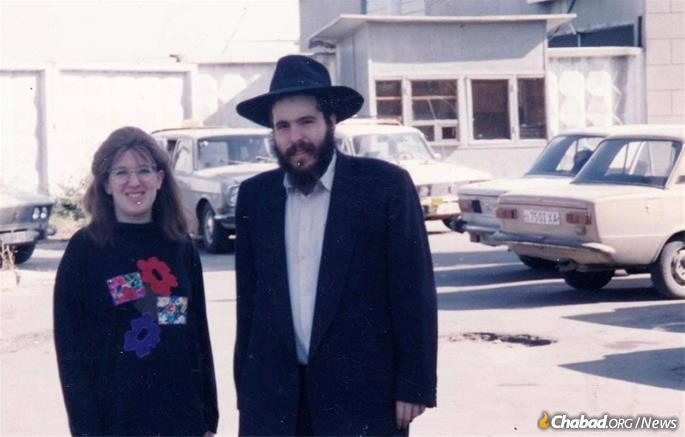
Heading to the Soviet Union
In the late 1980s, following high school in Sydney, Miriam Amzalak moved to Brooklyn to study at Bais Rivka Seminary, a post-high school Jewish learning program for young women in Crown Heights. Soon after graduation, she met and married Moshe Moskovitz, a young Torah scholar from Venezuela.
“When I was a teenager growing up in the ’80s, my friends constantly talked about shlichut, being an emissary of the Rebbe,” she tells Chabad.org. “We talked about what a tremendous honor it would be to help others—to go to a city, no matter how far away or how different it was from home.”
Since her new husband was a native Spanish speaker, Miriam assumed that they would be relocating to a country in South America and helping a Jewish community there, so she began learning Spanish. Then came the news that would change the trajectory of her life, her family’s life and the lives of thousands of Jews in Ukraine.
“My husband came home from kollel one day and said ‘Guess what, they are opening options for shlichut in the Soviet Union,’” she remembers. “I actually thought it was extremely amazing that people would be able to do that. It wasn’t something that I thought we could do since we already had a baby, and other people with children were told that shlichut in the Soviet Union wasn’t an option for them at that time. But then a couple with a child was given permission to go, so we decided to ask for permission and see if we would be lucky enough to be chosen for this new frontier.”
Which, of course, they were.
“The Soviet Union was still behind the Iron Curtain at the time, we had no idea what it looked like. We knew nothing about Kharkov and had no idea where it was, but we got things together as quickly as we could and off we went,” she says.
Not everyone was initially on board with the young couple’s decision. “Our parents were a bit shell-shocked when they heard,” acknowledged Moskovitz. “They knew I wanted to go on shlichut. Originally, it was going to be just for one year, then we would see. I think they thought, OK, for one year, they’ll have this experience … .”
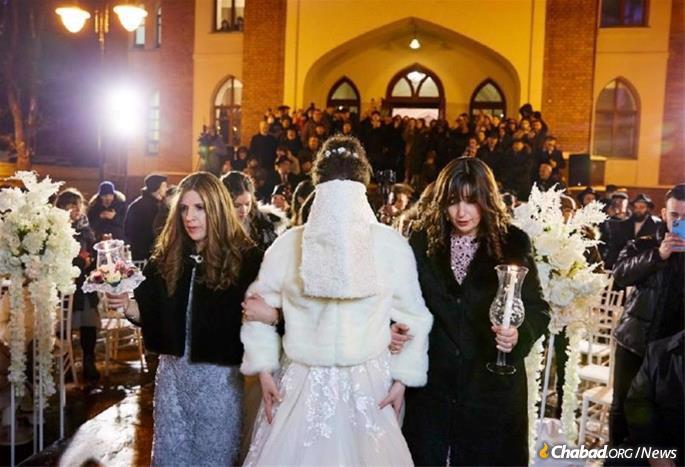
Thousands Turn Out to Welcome a Young Couple
The Moskovitzes and their infant son, Mendel, arrived in Kharkov on the last day of August in 1990, the ninth day of Elul, on the Jewish calendar. The synagogue, which had just been returned to the Jewish community of Kharkov, had been a Soviet sports complex for 70 years. It was where people went to play soccer.
There was nothing inside of the building that spoke to its prior life and the vibrant community of Jews who once studied Torah and prayed to G‑d there. Nothing, save for a Star of David on the outside of the building.
That didn’t deter the young couple. They held a kabbalat panim, a “welcome” event, the first Friday night they were in town. They were astonished when 1,000 people turned out to see them. Two days later, on Sunday morning, Miriam Moskovitz started a Hebrew school, and on Monday, her husband began a yeshivah.
“We quickly put up a makeshift ark, curtains to serve as a separation during prayer services, benches, chairs and tables, and immediately began hosting davening,” she recalls. “Everyone knew the building as a sports complex, but people were happy to come back and use it for what it was intended.”
The Moskovitzes didn’t speak Russian, the predominant language in Kharkov, and while “the language was a barrier, the excitement of the people that we were there definitely made up for the challenges,” Moskovitz recalls. “It was a totally different way of life, not just a different country that was miles away. It was worlds away from where we had come from.
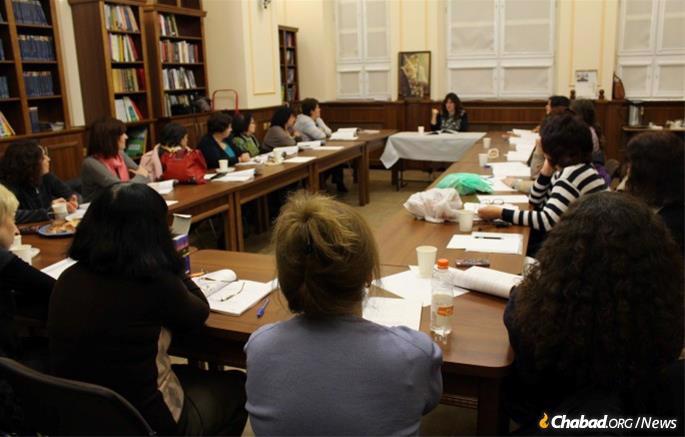
“Jewish-wise, this was a country where for 70 years under communism anything that looked Jewish was suppressed. And here we were, opening the shul, making Rosh Hashanah, making programs, with people who would just a few months earlier were embarrassed or frightened to say they were Jewish were now coming out of the woodwork; coming to shul, coming to programs signing up their kids for Sunday school … it was a chance for them to learn something about the Judaism they knew nothing about.”
While they got their programs off the ground, the couple’s home life was a challenge. They were living in a hotel room and had only a single burner on which to warm food.
Not that they had much of that, either, as there was also no kosher food to be had in Kharkov at that time. The couple relied on fresh fruits and vegetables, eggs, canned goods they had brought with them, fresh fish on occasion, and bread they were able to make themselves.

Making an Impact, One Soul at a Time
Yet they soon began to impact those around them.
“The first time I saw them, I was in shock,” recalls Kharkov resident Alexander Kaganovsky. “It was completely unexpected. I had never seen a rabbi in my life. It was something exotic to see a rabbi with a black hat and black coat in Kharkov. As I got to know them over the years, I realized these are fantastic people.
“The Moskovitzes gave the Jewish community of Kharkov a second chance at life,” he continues. “Before them, there was an underground minyan once in a while, but the real Jewish revival is because of them and their colleagues. They helped me start on my Jewish way of life. They really brought me—and not only me, but thousands of people in Kharkov—closer to Judaism.”
He refers to Moskovitz as “the Yiddishe mama of Kharkov,” saying “the most important thing is her ahavat Yisrael, her ‘love of other Jews.’ She gives so much love and care to everyone in the community.”
Vladislava Koshchii, a mother of two from Kharkov, recalls first meeting the Moskovitz family in 1992.
“My grandmother came home one day and said, ‘I heard we have a Jewish summer camp in the synagogue.’ I was 12 years old, a bat mitzvah. The synagogue was under renovation, yet there were so many Jewish kids there. It was such a big deal to have a Jewish camp then. It was the first time there ever had been one. I had been going to an English-language school, but I changed to the Jewish school.”
She also had a bat mitzvah celebration arranged by Moskovitzes, where she took the Hebrew name Sarah. Ten years later, when she faced a health issue, Moskovitz suggested that Vlada add the name “Chaya” to her Hebrew name, which she did.
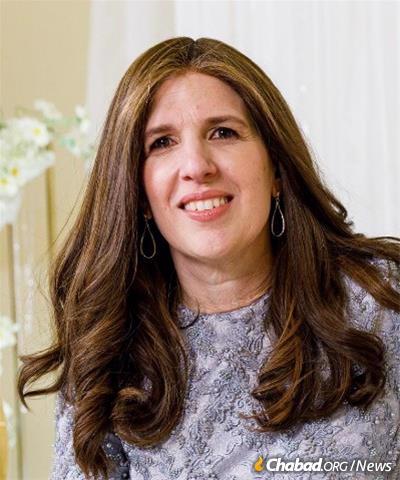
“I think she must have 40 hours in her 24-hour day,” Koshchii tells Chabad.org with a chuckle, adding that Moskovitz is a “very interesting person.”
“On the one hand, she’s the mama of the Jewish community in Kharkov. She is so strong; she has to be. It is important for her to be with us, and yet it’s hard to imagine given that she has so many kids and so many people in the community to deal with that she finds time for everyone,” says Vlada. “Whenever I say, I need to speak with her or just want to tell her something, she always says, ‘Yes, sure, I’m here.’
“She sets such a great example. I’m a surgeon and I’m tired after work, and when my daughter Mussia, who is 8, would say, ‘Mama, I want to talk to you,’ I would say, ‘I’m so tired.” But then I remember what Miriam would say to me, and I find the time to listen to Mussia.”
Koshchii, who relocated to Germany with her family at the outset of the nearly yearlong war in Ukraine, says the distance hasn’t changed her connections to the Moskovitzes. She nearly tears up as she recounts the Chanukah package she received from them with a menorah, a dreidel and other supplies for the holiday.
“We are really so close in our community, she is the manager, in a good way, of the Jewish community of Kharkov.”
Also impressed by all that the couple was doing were their parents, who had initially been concerned about their shlichut to Kharkov. Indeed, whenever the Amzalaks visited from Australia or the Moskovitzes from Venezuela, they were amazed to see the impact their children were having on the Jews in Kharkov.
As the community began to grow in their Jewish identity—classrooms filled with students eager to learn Torah, people coming to the synagogue to pray daily, people observing Shabbat and kashrut—so, too, did the Moskovitz family. A year after arriving in Kharkov, the couple welcomed their daughter Rivka, followed by Chaya, Nechama, Devorah Leah, Shoshana, Sholom Ber, Bracha, Sheina, Yossi, Yisroel and Malka; the children range in age from 8 to 33, and several are married. There are also many grandchildren.
That sense of closeness that people attribute to Moskovitz is also felt among the other Chabad emissaries in Kharkov—people like Sara Levinson, who moved with her husband, Chaim, to Kharkov 24 years ago, to help with Jewish community.
“Since we came to Kharkov, Miriam has been an inspiration to me. I look up to her as a wonderful, exemplary wife, mother, and shlucha. How she balances it all, has always been an example for me,” says Levinson, adding, “More than that, is her positivity. She is not fazed by the difficulties; always just moving ahead. She lives by the motto, ‘Think good and it will be good,’ and that is so evident in everything she does in Kharkov.
“On a personal note, we’ve been together for so many years. We’ve had children together, and are raising our families together; we are there sharing in each other’s simchot, and she has always been there for us in the good times and the hard times,” says Levinson, her voice full of emotion. “She is always available at a phone call’s notice and always ready to jump in and do what she can—cooking meals or taking the kids for a night.”

Keeping a Scattered, War-Torn Community Connected
Moskovitz and her husband have been there for the Kharkov Jewish community from the outset of hostilities last February. For the last year, her focus (and that of her husband) has been keeping their community of 25,000 to 30,000 Jews safe and connected, even as they have scattered throughout Europe, Israel and other parts of Ukraine because of the war.
For Moskovitz, what she does is simply an outgrowth of her education and upbringing.
“The Rebbe inspired us all to be shluchim, to be emissaries,” she says. “That’s something that brings happiness not only to others in your life, in your community, but to you as well. It gives you a sense of accomplishment in life.”
“Being there for someone else,” she attests, “makes your life physically and spiritually much better.”











